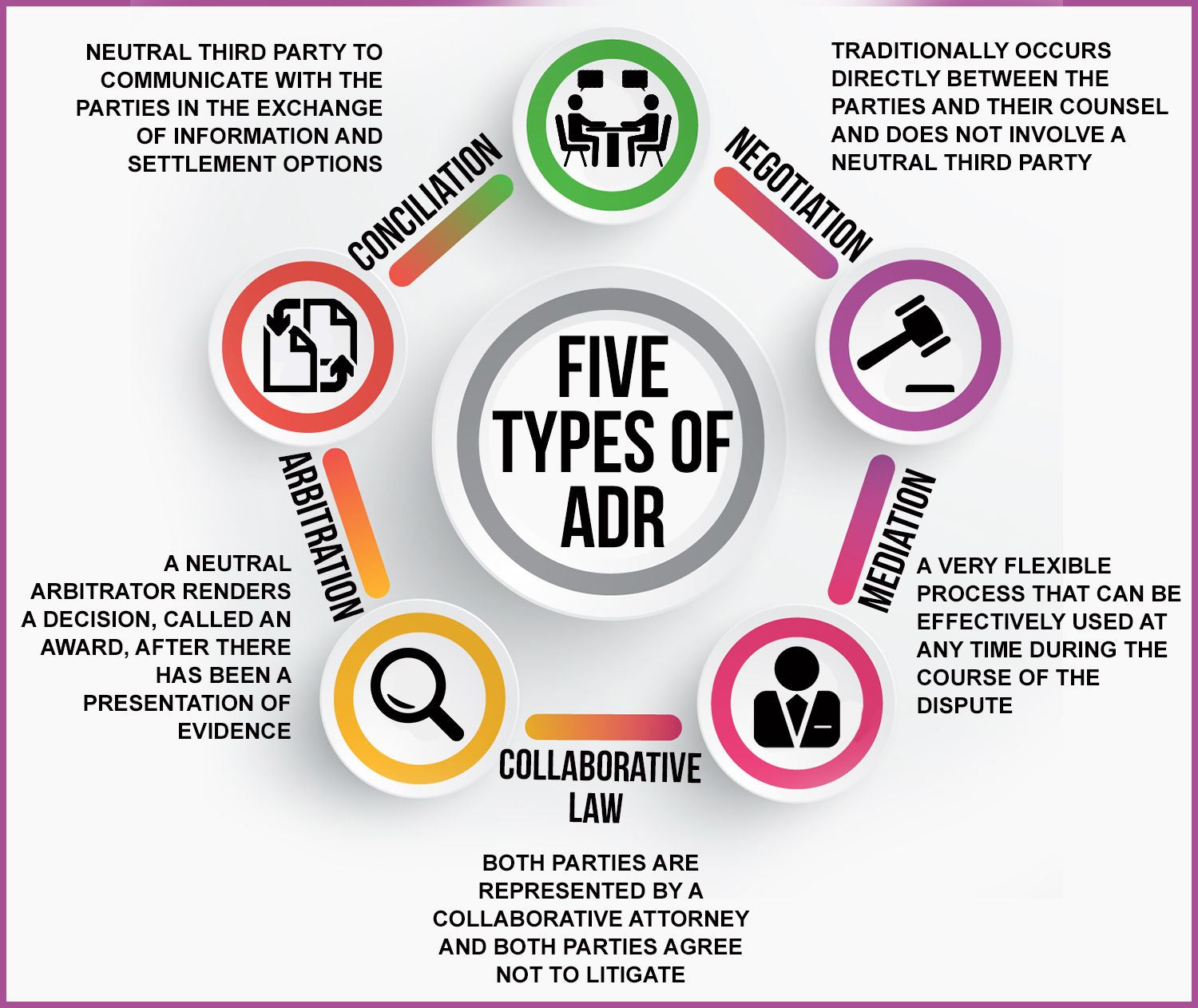View News
Beyond-the-Courtroom-Resolving-Disputes-Through-ADR

BEYOND THE COURTROOM: RESOLVING DISPUTES THROUGH ADR
In today's fast-paced world, navigating conflict can be stressful and time-consuming. Traditional litigation, while an essential part of the legal system, can be expensive, lengthy, and leave both parties feeling frustrated. Thankfully, there's a growing toolbox of Alternative Dispute Resolution (ADR) methods offering a more efficient and amicable way to resolve disagreements.
ADR is increasingly becoming the preferred method for resolving disputes. As technology advances, online dispute resolution (ODR) platforms offer even greater accessibility and convenience. By embracing ADR, we can create a more efficient and collaborative conflict resolution landscape, fostering better outcomes for everyone involved. Alternative dispute resolution (ADR) refers to the different ways people can resolve disputes without a trial.
Meaning of Alternate Disputes Resolution
ADR has traditionally been separated into two categories: informal procedures connected to established court mechanisms and means of settling conflicts outside of them. Irrespective of their inclusion in a larger process, the working mechanisms are essentially the same. ADR falls into four broad categories: arbitration, collaborative law, mediation, and negotiation. Conciliation is included in the definition of mediation by some scholars, while others classify it as a fifth category.
All ADR processes have conflict resolution as one of their main objectives. A process is considered conflict resolution if it results in a resolution. Litigation is typically regarded as an alternative to "alternative" dispute resolution. Corporate conflict resolution, for instance, can comprise a customer service division resolving disagreements on its own goods; addressing issues between customers and ADR has traditionally been separated into two categories: informal procedures connected to established court mechanisms and means of settling conflicts outside of them. Irrespective of their inclusion in a larger process, the working mechanisms are essentially the same. ADR falls into four broad categories: arbitration, collaborative law, mediation, and negotiation. Conciliation is included in the definition of mediation by some scholars, while others classify it as a fifth category.
Types of Alternate Dispute Resolution mechanisms
Various Alternative Dispute Resolution mechanisms can be classified as:
- Arbitration
- Conciliation
- Mediation
- Judicial Settlements inclusive of Lok Adalats
- Negotiations
Arbitration
Both parties to the issue select the person who will hear it and reach a consensus under this type of alternative dispute resolution procedure. The goal of arbitration is to quickly and economically reach a just conclusion through an impartial tribunal.
Conciliation
The goal of the conciliation procedure is to assist the parties in reaching a solution. Nonetheless, the conciliation does not obligate or bind the parties in any way; talks may continue until a mutually agreeable resolution is reached. The conciliator is an unbiased person who oversees the process. He engages in discussion, negotiation, and the facilitation of an equitable resolution as an active participant in the conciliation process.
Mediation
A mediator is involved in assisting the parties in dispute to reach an agreement. The parties in dispute themselves set the conditions of the settlement to be reached. The third-party does not impose any decisions on the parties but merely acts as a facilitator involved in improving the dialogue between the parties.
Lok Adalats
The establishment of Lok Adalats system of dispute settlement system was brought about with the Legal Services Authorities Act 1987 for expediting the system of dispute settlement. In Lok Adalats, disputes in the pre-litigation stage could be settled amicably.
Negotiations
It is the most often used alternative dispute resolution technique. A non-binding process whereby the parties start talks with each other without the help of a third party in an effort to reach a mutually agreeable settlement. In business, non-profit organizations, government agencies, court cases, international relations, and in private contexts including parenting, marriage, divorce, and daily life, negotiations take place.
Advantages of Alternation Dispute Resolutions ADR
- It is more viable, economic, and efficient because the procedural flexibility saves valuable time and money and there is no stress of a conventional trial
- Helping maintain confidentiality as the resolution of disputes takes place usually in private.
- The possibility of ensuring that specialized expertise is available on the tribunal in the person of the arbitrator, mediator, conciliator, or neutral adviser.
- The result is often creative solutions, sustainable outcomes, greater satisfaction, and improved relationships.
- Further, it offers greater direct control over the outcome. Personal relationships may also suffer less.
Conclusion
The current era of globalization and technology makes it imperative to discover more effective methods for resolving disputes. Despite being relatively young, alternative dispute resolution (ADR) has a significant role to play in the future legal system. In the present period, developed nations already favor these dispute resolution techniques because time is of the importance. This necessity must also be understood by our government and society, which must act swiftly to positively and more effectively address the problems and shortfalls of ADR.
"Unlock the Potential of Legal Expertise with LegalMantra.net - Your Trusted Legal Consultancy Partner”
Article Compiled by:-
Prerna Yadav
(LegalMantra.net Team)
Disclaimer: Every effort has been made to avoid errors or omissions in this material in spite of this, errors may creep in. Any mistake, error or discrepancy noted may be brought to our notice which shall be taken care of in the next edition In no event the author shall be liable for any direct indirect, special or incidental damage resulting from or arising out of or in connection with the use of this information Many sources have been considered including Newspapers, Journals, Bare Acts, Case Materials , Charted Secretary, Research Papers etc.

